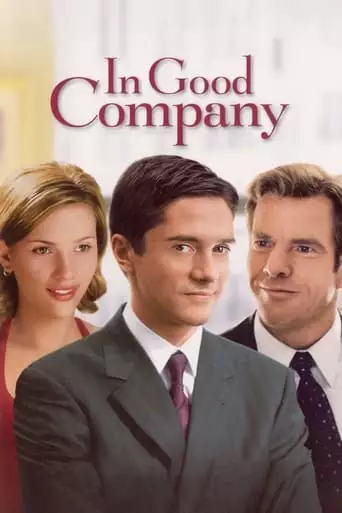
In Good Company (2004) Watch Online Free
Dan Foreman is a seasoned advertisement sales executive at a high-ranking publication when a corporate takeover results in him being placed under naive supervisor Carter Duryea, who is half his age. Matters are made worse when Dan’s new supervisor becomes romantically involved with his daughter an 18 year-old college student Alex.
In Good Company (2004), directed by Paul Weitz, is a poignant comedy-drama that delves into the complexities of corporate culture, intergenerational relationships, and personal growth. The narrative centers on Dan Foreman (Dennis Quaid), a seasoned 51-year-old advertising sales manager at Sports America, a prominent sports magazine. Dan is a dedicated family man, happily married with two daughters: 16-year-old Jana and 18-year-old Alex, who is preparing to enter college.
The tranquility of Dan’s life is disrupted when Globecom, a large international corporation, acquires Sports America. This corporate takeover leads to significant changes: Dan is demoted and becomes the subordinate of Carter Duryea (Topher Grace), a 26-year-old business school prodigy. Carter embodies the corporate ethos of synergy, focusing on cross-promotional strategies and bottom-line profits. In contrast, Dan values personal relationships and traditional business practices.
As the story unfolds, both Dan and Carter face personal challenges. Dan is supporting his two daughters and learns that his wife is pregnant with their third child. Meanwhile, Carter is dealing with the aftermath of a failed marriage and channeling his energy into work. Despite their differences, the two men form an uneasy partnership, learning from each other’s contrasting approaches to business and life.
The film also explores the relationship between Carter and Alex, who meet and develop a romantic connection. This subplot adds complexity to the narrative, highlighting themes of love, betrayal, and the impact of personal relationships on professional life. The film culminates in a series of events that test the characters’ values, leading to personal growth and a reevaluation of their priorities.
In Good Company examines the clash between traditional business practices and modern corporate strategies. Dan’s emphasis on personal relationships and trust contrasts with Carter’s focus on efficiency and profit, highlighting the tension between human values and corporate objectives.
The film explores the dynamics between different generations in the workplace. Dan and Carter’s relationship reflects the challenges and opportunities that arise when individuals from different age groups collaborate, offering insights into mentorship, respect, and understanding across generations.
Both Dan and Carter undergo significant personal transformations throughout the film. Dan learns to adapt to changing circumstances, while Carter confronts his own shortcomings and desires. Their journeys underscore the importance of self-awareness and the willingness to change.
The film delves into how personal relationships, such as family dynamics and romantic entanglements, influence professional decisions and behavior. The interactions between Dan, Carter, and Alex illustrate the complexities of balancing personal and professional lives.
Upon its release, In Good Company received positive reviews from critics and audiences alike. The film was praised for its sharp writing, engaging performances, and insightful commentary on corporate culture and personal relationships. Dennis Quaid’s portrayal of Dan Foreman was particularly lauded for its depth and authenticity. The film’s success at the box office and its critical acclaim solidified its status as a noteworthy entry in early 2000s cinema.
The film features standout performances from its lead actors. Dennis Quaid delivers a nuanced portrayal of Dan Foreman, capturing the character’s complexity and warmth. Topher Grace brings depth to Carter Duryea, effectively conveying his character’s evolution. Scarlett Johansson adds charm and depth as Alex, contributing to the film’s emotional resonance.
The screenplay is both sharp and humorous, balancing moments of levity with emotional depth. The dialogue is engaging and thought-provoking, contributing to the film’s overall impact and enjoyment.
In Good Company offers a critical look at corporate culture, highlighting the challenges and ethical dilemmas faced by individuals in the business world. The film provides a nuanced perspective on corporate dynamics, making it relevant to contemporary discussions about business practices.
The film explores the relationship between different generations in the workplace, offering insights into mentorship, respect, and understanding across age groups. This dynamic adds depth to the narrative and resonates with viewers of all ages.
The film delves into themes of personal growth, family dynamics, and self-discovery, offering a heartfelt and emotionally resonant experience. The characters’ journeys are relatable and poignant, making the film both entertaining and thought-provoking.
The supporting cast, including Marg Helgenberger and Philip Baker Hall, delivers strong performances that complement the main narrative. Their characters add richness and diversity to the story, enhancing its overall impact.
Directed by Paul Weitz, In Good Company showcases high cinematic quality with thoughtful direction. The film’s pacing, cinematography, and overall production contribute to its effectiveness and appeal.
After watching In Good Company, you may feel a sense of satisfaction and reflection. The film’s honest portrayal of personal and professional challenges, combined with its humor and emotional depth, offers a rewarding viewing experience. You might find yourself contemplating the complexities of corporate life, the importance of personal relationships, and the value of personal growth. The film’s balance of lighthearted moments and serious themes leaves a lasting impression, encouraging viewers to reflect on their own experiences and values. Overall, In Good Company offers a heartfelt and thought-provoking cinematic experience that resonates long after the credits roll.
